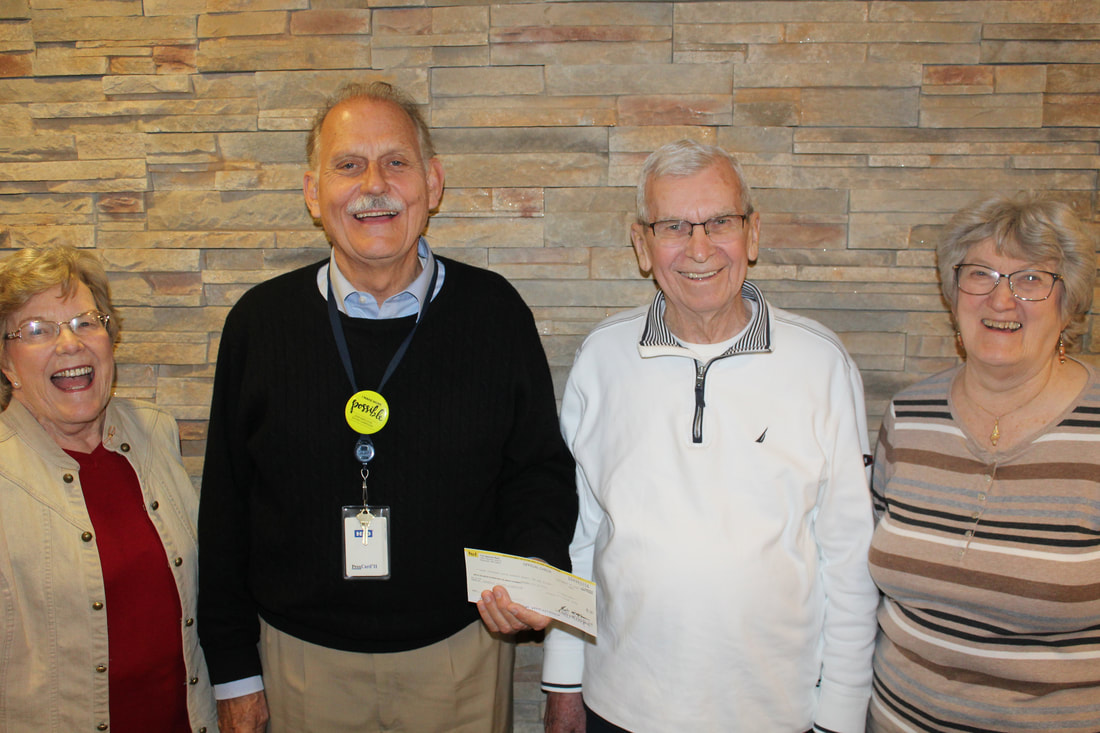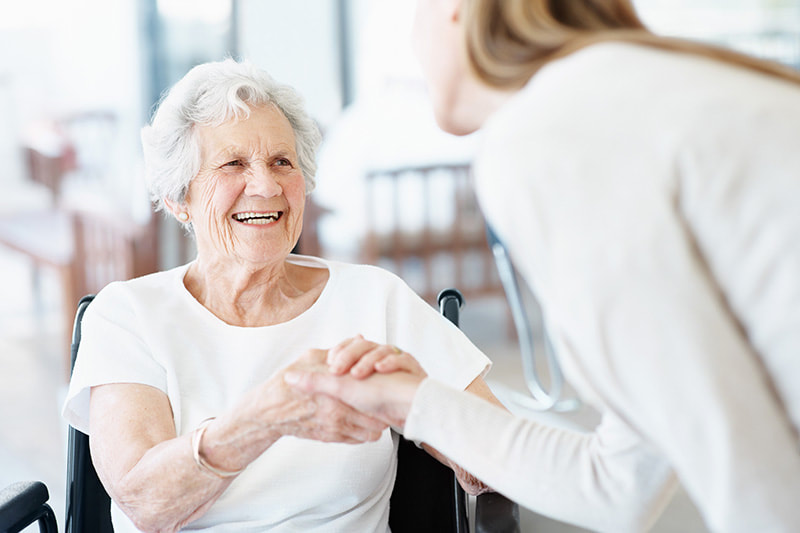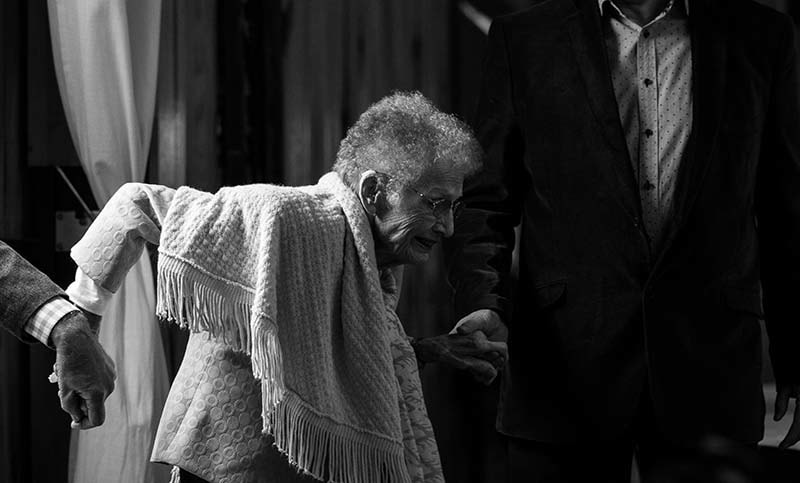|
Did you know? At least one in three of the millions of older adults admitted to the hospital every year is malnourished upon admission. Malnutrition is a growing problem among older Americans.
The economic impact of malnutrition is HUGE. It is estimated that disease-associated malnutrition costs the U.S. $157 billion every year. Other research points to a 300 percent increase in healthcare costs that can be attributed to poor nutrition status. Eating healthy for older adults can be a challenge, but here are some tips to stay healthy. The National Healthy Eating Guidelines for Older Adults Are…
When shopping at the grocery store, look for foods that fit these requirements. It’s easier to eat healthy when you don’t have unhealthy options around. Healthy eating is part of all we do here at Marin Luther Campus. In addition to our transitional care and assisted living apartments, our adult day clubs and stay by the day programs include healthy meals. Contact us to learn more. Martin Luther Campus is part of the Ebenezer family of Lutheran Senior Care Communities. We provide transitional care and assisted living apartments for seniors in Bloomington. We also have adult day clubs and memory care programs for seniors living at home. We’re located at 1401 East 100th St. Bloomington, MN. Are you interested in transitioning to assisted living or do you have a loved one that needs assisted living? Call us at 952.888.7751.
1 Comment
When persons with dementia move into a memory care community, it can take from several weeks up to three months or more for the person to adjust and feel comfortable with the new environment and routine. From my personal experience working with memory care residents at one assisted living for over a decade, I would say the average amount of time before the person settled in was no longer than a month. Your loved one may be angry for a while, and may seem more confused than before. This is a perfectly normal phase. Rest assured, things will improve in time. Here are ten tips to help ease the transition:
Generosity, service and compassion are values we’ve received in spades from our Martin Luther Campus Auxiliary. For more than 50 years, members have devoted themselves to the needs of our residents and our campus.
When our building opened in 1961, it was Auxiliary members who prepared the building by washing windows and assisting in serving the first meal. Over the years, their financial support has continued in countless ways with everything from therapy equipment and funds to start our adult day program to a campus bus with snow tires and our lovely grand piano in the Great Room. The enhancements to our campus are significant and long-lasting for residents. On September 27, Martin Luther Auxiliary members: Ellen Thompson, Lloyd Ward, and Margit Hauge — gathered to present Michael Ziomko of the Ebenezer Foundation with another generous donation to support our Lifelong Learning art and music programs. One last investment in the residents of Martin Luther Campus. What a legacy of service and care! Thank you Martin Luther Auxiliary for the many ways you’ve helped make Martin Luther Campus a special place. We’re forever grateful for you. When a person with dementia asks you a question for what seems like the 29th time in a row, how do you respond?
Have you found yourself saying (or almost saying) anything like this:
Physical changes in the brain can result in a person with dementia no longer being able to remember that s/he is repeating themselves. These changes also make it difficult for a person to stop a repetitive motion such as rubbing hands together, or tapping on a table. Anxiety and tension, (byproducts of the disorientation and memory loss of dementia) can translate themselves into repetitive motions or questions which others may experience as annoying. Whatever a person with dementia does that appears “wrong” or “inappropriate” or “unnecessary” to our brains and our way of relating to the world is actually an expression of a need. That’s why I like the phrase “behavioral expression” so much better than the term “behavior” when referring to the challenges that can arise when someone lives with dementia. “Behavior” often implies judgment, that the person is being “bad”, which encourages us to assume that if the person only tried a little harder, they could control that incessant tapping, stop asking those repeated questions, and avoid using those four letter words that they never used before! The fact is that the person could only exert control over those things if they could STOP having dementia. This is, alas, too much to ask. We must have patience and compassion for the seriousness of a broken brain. It’s up to us whose brains are in better shape, who have better control over our actions and responses to others to take a deep breath…and focus on helping the person out with whatever need is making itself known, however it may be expressed. A hungry person might ask “What’s for lunch?” over and over. For this person, giving them a piece of paper with the upcoming “menu” written down may satisfy the question. In addition, getting the person involved in some aspect of meal or table preparation might be an effective distraction. If a person with dementia is in pain, they might rock, pace or otherwise move rhythmically to express their discomfort. We must be sensitive to the comfort–related needs of the person, and do what we can to alleviate them. Sometimes, giving a repetitive task like winding yarn or folding towels can be a comforting distraction for the person. Sometimes people may be bored, craving a sense of purpose and meaning. Repetitive movement can be reflective of things the person used to enjoy doing on a regular basis. If your loved one asks you, “What do I do now?” they are in effect asking you to involve them in something that will give them a sense of pleasure, peace, or usefulness. Put something of interest in their hands. Ask them for help with a task. We all need to be of use. This does not stop when we get older or when we develop dementia. An inability to take initiative is usually part of the dementia progression. Do not assume that your loved one is beyond having interest in things that have been important to them. The person may be at a loss as to how to access or activate that interest. In that case, it falls to us to remind the person of their accomplishments and adapt past interests into activities they are able to enjoy now. It is a good idea not to discuss plans with a person (appointments, visitors, outings) who has very short-term memory loss. Knowing an event too far ahead of time can cause extreme agitation (as well as, you guessed it, repeated questions) for a person with dementia. This tendency will vary, of course, person to person, but it is necessary to monitor and adapt to the changes as dementia progresses. Sometimes the need expressed is an emotional one. The person may be fearful, sad, or feeling insecure. That emotion could come out as a repeated question or as a physical expression, i.e., pacing, as the person attempts to express what is inside. Listen for the emotion behind a person’s question or behavioral expression, and respond to that, i.e., “You seem worried. I’m right here if you need anything. “We will be together all day.” Putting on soothing music that the person likes and using gentle touch may provide further reassurance. If the person seems to need a hug, tell him or her that YOU need a hug, and they will very likely oblige you with one. Then they get to feel that they are giving you something that YOU need. We all feel better when that happens! --Marysue Moses, Ebenezer Dimensions Program Coordinator --Information in this post is partially based on material in Coping with Behavior Change in Dementia: A Family Caregiver’s Guide, by Beth Spencer and Laurie White By: Megan Radamaker MPH-RD student at the University of Minnesota
When you think of the term malnutrition what do you picture? More often than not the term is associated with a visual of someone that is thin, frail, and undernourished. This may be accurate, but it is not the only picture of malnutrition. Can someone that appears to be heavy or overweight be malnourished also? The answer is yes. According to the World Health Organization the term malnutrition refers to deficiencies, excesses, or imbalances in a person’s intake of energy and/or nutrients. The status of malnutrition is not simply dependent on weight status or appearance. This is a common misconception, even within the medical field and among health professionals. Elderly populations are vulnerable to malnutrition and are often underdiagnosed. People that are malnourished have worse health outcomes than adequately-nourished patients. This often results in increased physician visits, longer hospital stays and readmissions, decreased function and quality of life, and increased healthcare costs. It is essential that nutrition screening and assessment is a routine aspect of clinic workflow both in the hospital setting and in outpatient care. Registered dietitian nutritionists (RDNs) are trained to clinically assess patients and identify nutritional risks to address. The field of dietetics is moving towards including hands on physical assessments within the dietitian’s scope of practice in order to more accurately identify malnutrition. The Malnutrition Universal Screening tool, along with other widely accepted tools, primarily focus on criteria around a patient’s current weight and body mass index (BMI) and unplanned weight loss. However, patients with subtle changes in fat and muscle mass can be difficult to identify. Additionally, by focusing solely on weight status, many cases of malnutrition are missed. In our society, where we have an overabundance of foods that are low in nutritional value, such as fast-food or processed foods, malnutrition can look many different ways. There are multiple variables at play that impact a person’s nutritional status and therefore it is important to consider more than weight status when evaluating for malnutrition. Better nutrition for seniors can lead to better health outcomes for all shapes and sizes! Sources: Compher, C., & Mehta, N. M. (2016). Diagnosing Malnutrition: Where Are We and Where Do We Need to Go? Journal of the Academy of Nutrition and Dietetics, 116(5), 779-784. doi:10.1016/j.jand.2016.02.001 Leading Nutrition Experts Speak up about Malnutrition. (2016, April 17). Retrieved February 11, 2018, from http://www.eatrightpro.org/resource/media/press-releases/new-in-food-nutrition-and-health/nutrition-experts-speak-up-about-malnutrition Rinehart, S. W., Folliard, J. N., & Raimondi, M. P. (2016). Building a Connection between Senior Hunger and Health Outcomes. Journal of the Academy of Nutrition and Dietetics, 116(5), 759-763. doi:10.1016/j.jand.2016.02.009 http://www.who.int/mediacentre/factsheets/malnutrition/en/ |
Director of Community Relations
Hello friends, my name is Kate and I'd love to share with you ALL of the wonderful things happening at Martin Luther Campus. Be sure to check our Blog, Lifestyle page and Facebook page often to stay updated on the happenings at our community! Archives
November 2023
Categories |
|
telephone |
|
DIRECTIONSimap
|
© 2021 Fairview Health Services
|






 RSS Feed
RSS Feed

